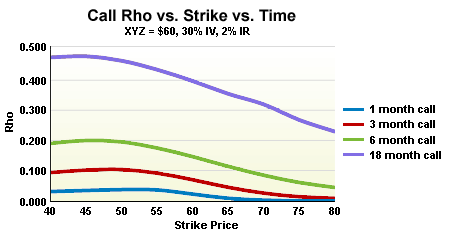Rho
Rho is the measure of an option's sensitivity to interest rate changes. Similar to Vega, interest rate changes impact longer-term options much more than near-term ones (see chart below). Interest rates are used in pricing models to take into consideration an options price based on its “hedged value”, the idea that an investor uses long or short stock to hedge (or manage risk associated with) option positions. Rho is positive for purchased calls as higher interest rates increase call premiums. Conversely, Rho is negative for purchased puts as higher interest rates decrease put premiums.

For example, interest rates are currently 3.00% and Rho on a $100 call option is +.45, if interest rates suddenly went to 4%, the premium would rise by $.45. Conversely, if Rho for the put was -.45, the put premium would decline by $.45 per share. Of course this assumes the other pricing factors remain constant.
An investor might ask, “Why do interest rates impact option prices?” It has to do with the cost of carrying the position over time. Pricing models take into consideration the cost of capital (or proceeds from short sales) used to offset risk. For instance, if a professional investor looking to buy a deep in-the-money put with a Delta of nearly -1.00, to hedge (to be “Delta neutral”), the market maker would buy 100 underlying. Buying the shares requires him to borrow money (or he loses interest on existing funds). If interest rates increase, the expense from carrying a long stock position increases. Thus, an investor buying this put is willing to pay less, should interest rates rise to cover the expenses of carrying the position over time.
The higher the price of the stock and the longer time until expiration generally means a greater sensitivity to changes in interest rates (higher absolute Rho values). The cost of carrying a $250 stock position over time will be greater than that of a $50 stock and the longer the time frame the position is held, the greater the cost of money.
In summary, an option position that, if hedged to Delta neutral, requires the investor to buy the underlying shares (such as a short call or long put) and would have a negative reaction to increasing interest rates. Conversely, a position where the investor sells short stock to become hedged would be negatively impacted by a decrease in rates. It is important to understand interest rates are not the same industry wide. Furthermore, interest rates vary from clearing firm to clearing firm, brokerage house to brokerage house and even account to account.

